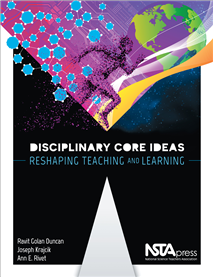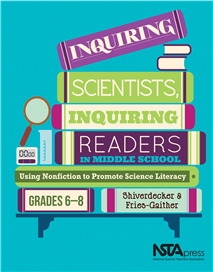All Resources
Book Chapter
This chapter focuses on energy—perhaps the most important idea in all of science. It is used by every scientific discipline and applies to all known...
Book Chapter
Core Idea LS1: From Molecules to Organisms: Structures and Processes
In this chapter, the disciplinary core idea (DCI) is central to biology and also serves as the glue connecting all four DCIs in the life sciences stra...
Book Chapter
Core Idea LS2: Ecosystems: Interactions, Energy, and Dynamics
This chapter begins by suggesting three ways in which a deeper understanding of ecosystems could enrich students’ lives and support their participat...
Book Chapter
Core Idea LS3: Heredity: Inheritance and Variation of Traits
The heredity disciplinary core idea (DCI) is about the biological mechanisms that underlie many familiar and less familiar phenomena such as genetic d...
Book Chapter
Core Idea LS4: Biological Evolution: Unity and Diversity
This chapter has hopefully provided a bit more insight into the disciplinary core idea (DCI) of Evolution: Unity and Diversity. Taking an evolutionary...
Book Chapter
Core Idea ESS1: Earth’s Place in the Universe
Earth and space sciences consists of three disciplinary core ideas (DCIs) that help to explain a wide variety of Earth-related phenomena, including th...
Book Chapter
Core Idea ESS2: Earth’s Systems
The Earth exists as one large system, consisting of an array of interconnected subsystems. Often, scientists focus their efforts on exploring and expl...
Book Chapter
Core Idea ESS3: Earth and Human Activity
Of all the fields of scientific study, the Earth sciences are one of the most interdisciplinary. This is particularly true for this disciplinary core ...
Book Chapter
Core Idea ETS1: Engineering Design
The engineering, technology, and applications of science disciplinary core ideas (DCIs) address questions about the ways in which engineers use scienc...
Book Chapter
Core Idea ETS2: Links Among Engineering, Technology, Science, and Society
This component of the disciplinary core idea (DCI) brings together two movements in science education—environmental education and science, technolog...
Book Chapter
This lesson helps students understand the function of the nucleus, cell membrane, cell wall, mitochondria, and chloroplasts. Students will relate the ...
Book Chapter
This lesson helps students: develop and use a model to explain the inheritance of traits; predict the frequency of genotypes and phenotypes in a cross...
Book Chapter
Seriously …That’s Where the Mass of a Tree Comes From?
This lesson helps students identify photosynthesis as the process through which plants make glucose, determine that most of the mass of a plant comes ...
Book Chapter
Chemistry, Toys, and Accidental Inventions
This lesson helps students distinguish between reactants and products, explain the law of conservation of matter, measure properties or reactants and ...
Book Chapter
Nature’s Light Show: It’s Magnetic!
This lesson helps students draw and describe Earth’s magnetic field, explain the phenomenon of the aurora, summarize a text, including the central i...



